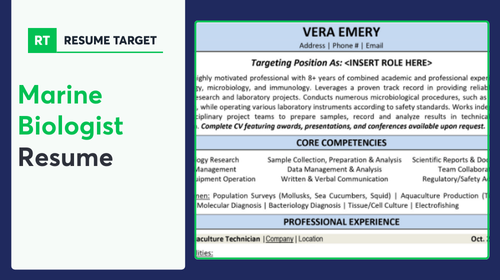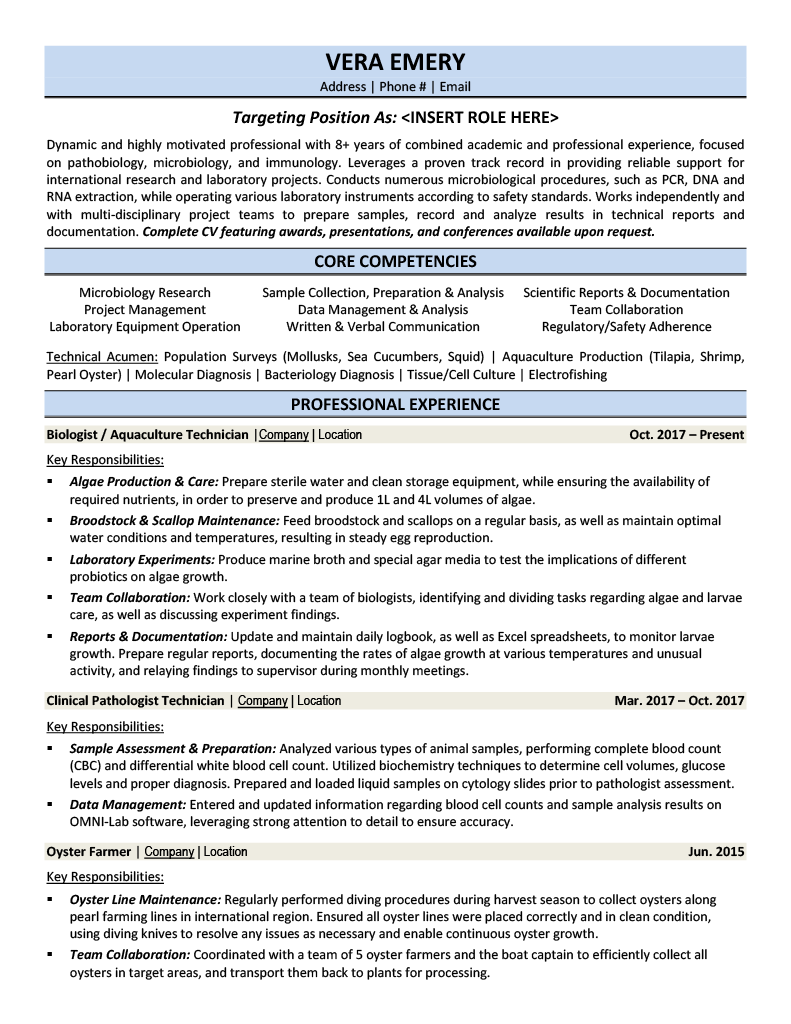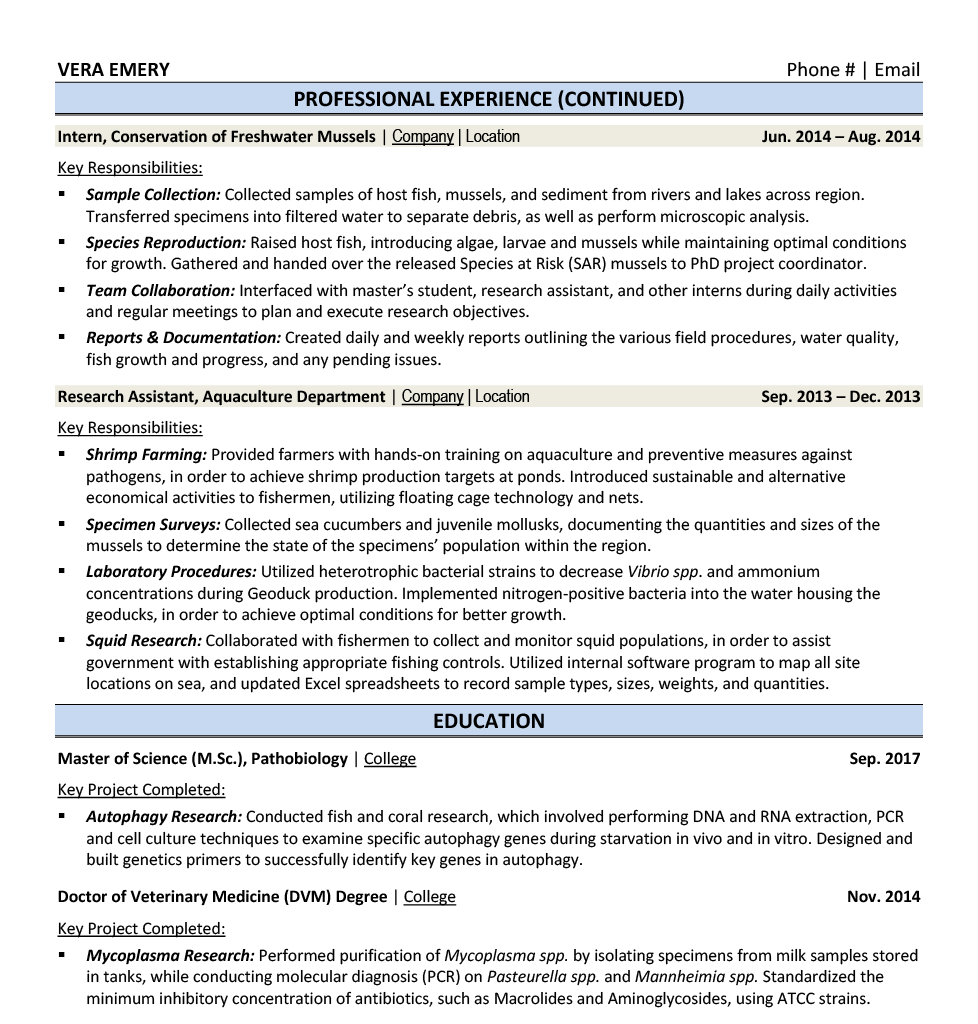

Turning ocean research and complex field studies into compelling resume content can feel like swimming against the tide. Most marine biologists struggle to translate their technical expertise into language that hiring managers understand.
Are you finding it challenging to showcase both your scientific knowledge and practical field experience? Your resume needs to bridge the gap between detailed research work and real-world impact on marine conservation and research programs.
Resume Target specializes in helping marine biologists communicate their value to employers in clear, powerful terms. We'll help you create a professional narrative that connects your specialized skills to the exact requirements of your target research institutions and organizations.


As guardians of our ocean's ecosystems, marine biologists play a crucial role in protecting marine life, with many focusing their expertise on the Outer Continental Shelf where human activity meets delicate marine habitats.
Your work as a marine biologist would involve diving into both literal and figurative depths - from tagging sea creatures and collecting vital specimens to conducting sophisticated statistical analyses that help predict how climate change might affect marine ecosystems.
Whether you're passionate about protecting endangered species or fascinated by deep-sea ecosystems, the path to becoming a marine biologist offers diverse opportunities to specialize, from focusing on specific species to addressing broader environmental challenges that affect our oceans.
Let's talk about the exciting earning potential in marine biology! Your passion for marine life and ocean conservation can translate into a rewarding career with competitive compensation that grows significantly as you gain experience and expertise in the field. Here's what's exciting about pursuing this dynamic career path.
Figures from: Marine Biologist Salary Guide
Marine biology offers diverse career paths from research to conservation, with opportunities to make a real impact on ocean ecosystems. Your journey can lead to prestigious roles in academia, research institutions, or environmental organizations.
To excel in marine biology, you'll need to combine technical expertise with practical field experience and strong analytical capabilities.
Launch your marine biology career by combining hands-on experience through NOAA internships, volunteer work at aquariums, and targeted coursework in marine sciences to build a strong foundation in this fascinating field.
Requirements from Research.com
From coastal research labs to government agencies, marine biology careers span diverse sectors and waterfront locations.
Figures from U.S. Bureau of Labor Statistics
Struggling to translate your countless hours of field research, lab work, and marine conservation efforts into a compelling resume that catches employers' attention like a rare species sighting? This comprehensive, section-by-section guide will help you craft a marine biologist resume that showcases your expertise, research accomplishments, and passion for marine science.
As a Marine Biologist, you're comfortable analyzing complex marine ecosystems and conducting detailed research, but condensing your professional story into a few powerful lines can feel more challenging than tracking migration patterns.
While you excel at documenting marine species behavior and managing conservation projects, translating these specialized skills into a compelling summary that catches a hiring manager's attention requires a different kind of expertise - one that showcases both your scientific achievements and your potential value to their organization.
How would you describe your unique combination of marine research specialties and the broader ecosystems or species groups you've worked with throughout your career?
Reason: This helps establish your specific niche within marine biology while demonstrating the breadth of your expertise, allowing readers to immediately understand your professional focus and scope of experience.
What would you say is your highest-level contribution to marine conservation, research methodology, or ecosystem understanding that sets you apart from other marine biologists?
Reason: This question helps you articulate your unique value proposition and professional identity within the field, which is crucial for standing out in a competitive scientific community.
How do you bridge the gap between technical marine biology expertise and communicating findings to different stakeholders (public, policymakers, or funding organizations)?
Reason: This highlights your ability to translate complex scientific concepts into actionable insights, which is increasingly important in modern marine biology roles where communication and influence are key.
As a marine biologist, you'll need to showcase both your scientific expertise and practical fieldwork abilities, from complex data analysis to hands-on specimen collection and diving certifications.
Your resume should balance technical laboratory skills like microscopy and water quality testing with essential soft skills such as research documentation and cross-functional team collaboration.
Showcase your marine research expertise by organizing your experience into three impactful sections: a compelling role overview that sets the context of your work, quantifiable achievements from your field studies and lab work, and core responsibilities that highlight your technical and analytical capabilities in marine science.
Many marine biologists struggle to translate complex research findings and field observations into clear, business-relevant accomplishments that hiring managers can quickly grasp. Transform your scientific impact into compelling metrics by connecting your research, conservation efforts, and marine ecosystem management to quantifiable outcomes that demonstrate both scientific rigor and practical value.
The responsibilities section demonstrates how Marine Biologists contribute to scientific research, conservation, and environmental protection. Your duties should clearly show how your technical expertise translates into meaningful research outcomes and practical environmental solutions that support organizational goals.
Your marine biology credentials should highlight both your academic achievements and specialized certifications that demonstrate field expertise. Start with your highest degree in marine sciences or related field, then list relevant certifications like scientific diving credentials or marine mammal handling permits that showcase your practical capabilities.
Now that you've created a strong foundation using Resume Target's expert guidelines, you're ready to transform your resume into a powerful tool for landing your dream marine biology position.
While many candidates focus solely on customizing their cover letters, tailoring your resume for specific marine biology roles is equally crucial for showcasing your specialized research experience, fieldwork, and technical expertise.
A customized marine biologist resume not only navigates through ATS systems by incorporating role-specific keywords but also demonstrates to hiring managers that your unique combination of scientific knowledge, research skills, and marine conservation experience perfectly aligns with their organization's needs.
Ready to make waves in your job search? Let's transform your marine biologist resume into a compelling document that proves you're the perfect candidate to dive into their team!
Don't let a lack of professional experience hold you back from pursuing your dream career as a Marine Biologist!
Your academic background, research projects, and lab work can create a compelling story that showcases your potential in marine science.
Focus on highlighting your scientific research abilities, fieldwork experience, and technical laboratory skills to stand out to employers.
For more guidance on crafting the perfect entry-level resume, check out the Student Resume Writing Guide to help structure your qualifications effectively.
Your resume summary is your chance to showcase your passion for marine science, highlighting your research projects, lab work, and fieldwork experience during your academic career.
Focus on translating your educational achievements and internships into valuable professional skills that align with marine biology positions.
"Dedicated and detail-oriented Marine Biology graduate with extensive laboratory research experience and 500+ hours of fieldwork studying coastal ecosystems. Proficient in water quality analysis, species identification, and data collection methodologies, with demonstrated experience in conservation projects and marine mammal monitoring. Completed two summer internships at the Pacific Marine Research Center, contributing to ongoing research on coral reef preservation. Seeking to leverage strong analytical skills and passion for marine conservation into an entry-level Marine Biologist position focused on ecosystem protection and research."
Now's your chance to showcase the specialized marine science knowledge and research skills you've developed through your academic journey!
Transform your educational background into compelling content by highlighting relevant coursework like "Marine Ecosystems"or "Oceanographic Field Methods,"along with any significant research projects involving species identification, habitat analysis, or marine conservation.
Availability of common courses for a Marine Biology degree/certification.Relevant Coursework: Marine Ecology | Oceanography | Marine Vertebrate Biology | Conservation Biology | Aquatic Chemistry | Marine Microbiology
Key Projects:
Coral Reef Health Assessment Study: Conducted comprehensive analysis of coral reef ecosystems to evaluate the impact of rising ocean temperatures on species diversity and reef resilience.
Marine Mammal Migration Tracking Project: Collaborated with research team to study seasonal migration patterns of humpback whales using satellite tracking technology.
Transform your academic achievements, laboratory experience, and fieldwork training into compelling skills that showcase your readiness for marine biology research and conservation work.
As an aspiring Marine Biologist, highlighting these foundational skills demonstrates your preparation for research positions, conservation projects, and the growing field of marine science, where opportunities continue to expand with increasing focus on ocean health and sustainability.
When you're spending your days deep in marine research and conservation, it's challenging to surface for air and translate your complex fieldwork, research findings, and technical expertise into language that hiring managers can quickly grasp.
At Resume Target, we specialize in crafting resumes for environmental science professionals, having helped countless marine biologists showcase their research contributions, field studies, and conservation impacts.
Our deep understanding of the environmental sector means we know exactly how to position your experience with species monitoring, habitat assessment, or marine policy work to catch the attention of your target employers.
With increasing focus on ocean conservation and climate change research, there's never been a better time to upgrade your career marketing tools - let's connect today to create a resume that makes waves in your job search.
Impress any hiring manager with our Environmental resume writing service. We work with all career levels and types of Environmental professionals.
Learn More → Environmental Resume Writing Services